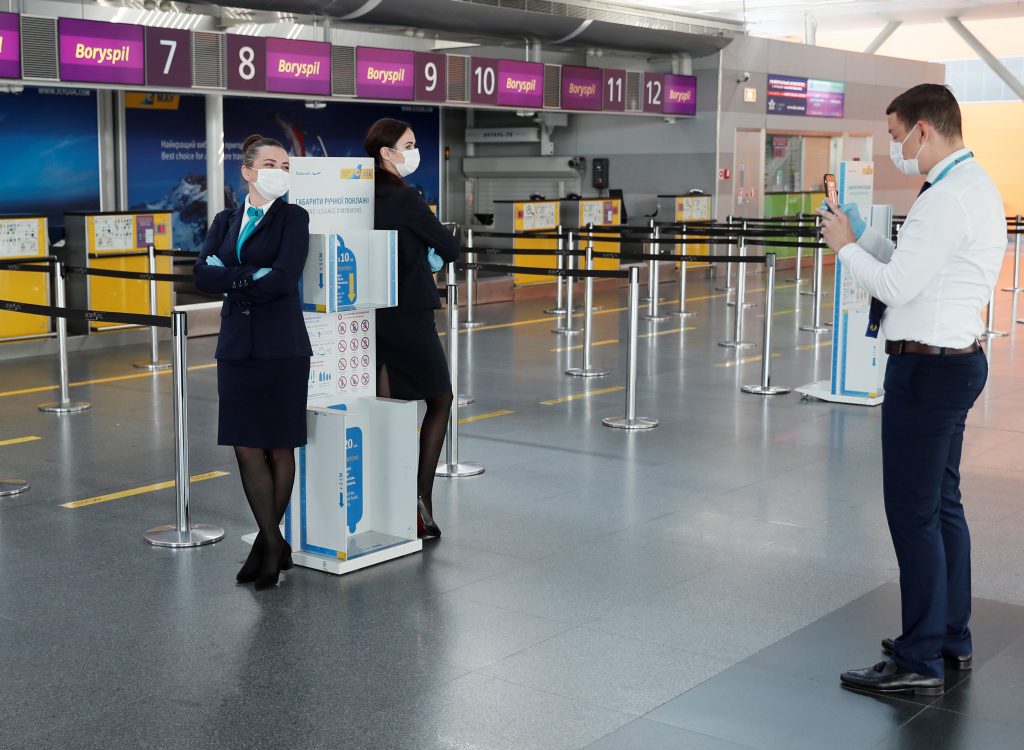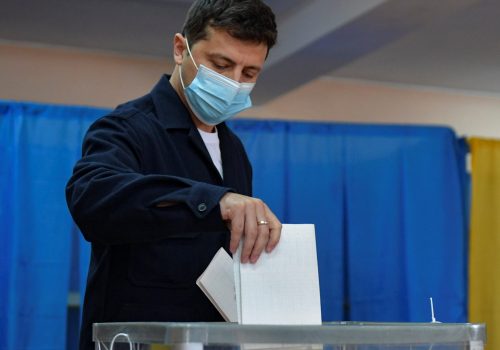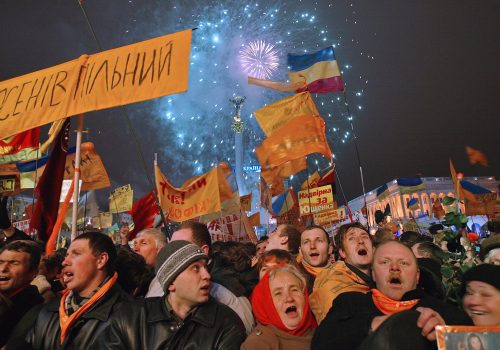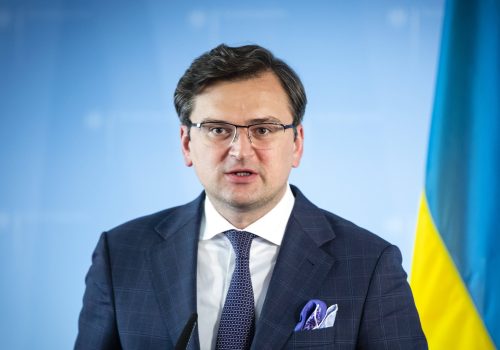I vividly remember looking out of my twelfth-floor apartment window in early 2020 and seeing gray smoke continually towering from the cemetery up on the hill. This seemed somewhat out of the ordinary, so I made a couple of calls trying to ascertain what could be the cause. A dark thought came to mind, envisaging the 1960’s brutalist white concrete Baikove crematorium exhaling uninterrupted smoke.
The next morning the smoldering continued. Eventually, I resolved to venture out and investigate, passing the cemetery’s long red brick wall as I made my way up the hill. I then breathed a sigh of relief when I discovered that the smoke was being generated by graveyard gardeners burning leaves, sweeping up the foliage and dead tree branches within the burial grounds. My concern was misplaced, but it reflected the very real anxiety that hung over everyday in Ukraine during the first weeks of spring 2020.
One day earlier, on Friday the thirteenth of March, we had closed the offices of the American Chamber of Commerce in Ukraine and set out to work online. The coronavirus crisis had reached Ukraine and the entire country was preparing to go into lockdown.
A few weeks prior to the start of nationwide coronavirus restrictions in Ukraine, a bus carrying Ukrainian evacuees from Wuhan in China, the epicenter of the deadly outbreak, had been met by crowds of heated demonstrators in central Ukraine’s Poltava region. Members of the public had hurled stones as the coach approached the Novi Sanzhary health spa.
Many people were clear petrified as the Covid virus began to spread globally. No one knew exactly what to expect. By mid-March, we had all come to understand that COVID-19 was deadly serious. Ukraine’s healthcare system, which has been underfunded and riddled with corruption for many years, seemed particularly unprepared to cope with a killer pandemic.
Stay updated
As the world watches the Russian invasion of Ukraine unfold, UkraineAlert delivers the best Atlantic Council expert insight and analysis on Ukraine twice a week directly to your inbox.
As news of the Ukrainian government’s lockdown plans emerged, top management from American Chamber of Commerce member companies started calling and asking what we should do. General managers quickly realized that they would no longer be able to achieve the business results they had planned for the year. However, it also soon became clear that the immediate priority for everyone was how we could help the community we live in. How could businesses help the vulnerable, and, most importantly, what could we do to support Ukraine’s front line workers and doctors?
It was heartwarming to see the immediate generosity of businesses coming together and helping, both financially and by providing in-kind goods to hospitals. From the very beginning of the pandemic, the Ukrainian business community played a significant role in helping Ukraine’s vulnerable. There is no question that this help has saved lives.
Since those first days of coronavirus lockdown in March 2020, I have conducted over 120 video interviews with the General Managers of leading companies in Ukraine. I have asked how they responded to the pandemic, and sought their insights into the importance of leadership during times of crisis. The resulting videos are quite inspirational and can be viewed online.
A key message from the interviews was the overwhelming focus on empathy within the Ukrainian business community. Many top managers said they had re-evaluated company values, allowing them to focus on what was truly important. Their response to COVID was all about understanding colleagues, sharing feelings, and showing compassion, as expressed in the beautiful Ukrainian word “Spivperezhivanniya”, which succinctly captures these sentiments. Most importantly, although business leaders understood that their business plans for 2020 were shattered, they continued to assist those in need.
Eurasia Center events

In November 2020, we marked the annual thanksgiving holiday. This year’s event took place online, without the traditional Thanksgiving dinner at Kyiv’s Hilton Hotel. We presented our annual Thanksgiving Award to Ukraine’s 29-year-old Deputy Prime Minister, Mikhail Fedorov, for his work in reducing bureaucracy and transforming Ukraine into a digital society.
An award also went to Paul Niland, a Kyiv-based Irish writer and businessman, for launching Ukraine’s first-ever suicide prevention hotline, Lifeline Ukraine. Mental health has always been a taboo topic in Ukraine, especially among the male population, who are often reluctant to discuss vulnerabilities such as mental health issues. The 7333 Lifeline that Paul set up has a strong focus on PTSD (post-traumatic stress disorder), which is so important as Ukraine’s soldiers defend the country from Russian aggression for the seventh year in a row.
AmCham Ukraine just held our first ever online Annual General Meeting. It was bizarre conducting an AGMM via Zoom while sat at home in slippers. This is the current reality of life in a time of global pandemic. We do, however, very much look forward to coming back to in-person networking events. Hopefully we will soon be meeting once again with Ukraine’s business leaders in Kyiv and other cities while dressed in our Sunday best.
With a coronavirus vaccine coming through, we can now see the first signs of a light at the end of the tunnel, even if the route ahead remains very long and dark. Ukrainian businesses have endured a uniquely challenging year of unprecedented restrictions and setbacks, but it is heartening to report that a mood of corporate social responsibility and community spirit has remained constant throughout.
Andy Hunder is President of the American Chamber of Commerce in Ukraine.
Further reading
The views expressed in UkraineAlert are solely those of the authors and do not necessarily reflect the views of the Atlantic Council, its staff, or its supporters.

The Eurasia Center’s mission is to enhance transatlantic cooperation in promoting stability, democratic values and prosperity in Eurasia, from Eastern Europe and Turkey in the West to the Caucasus, Russia and Central Asia in the East.
Follow us on social media
and support our work
Image: Employees at Ukraine's Boryspil International Airport pose for photos in protective masks and gloves. (REUTERS/Gleb Garanich)




